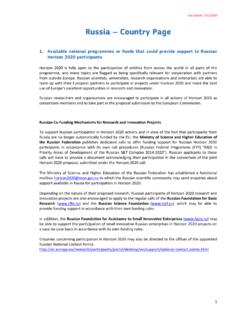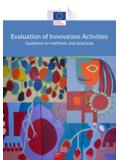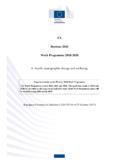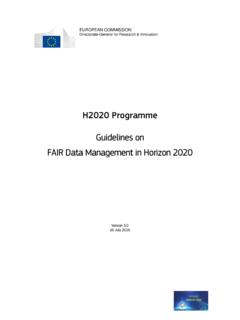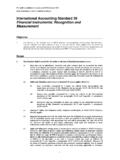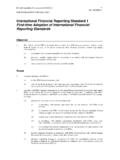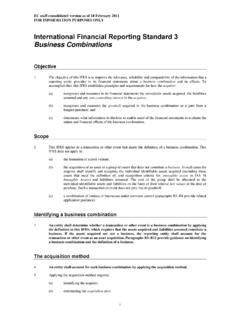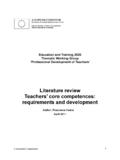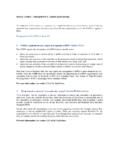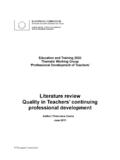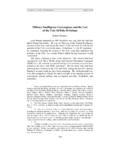Transcription of A credible enlargement perspective for and enhanced EU ...
1 european . commission . Strasbourg, COM(2018) 65 final COMMUNICATION FROM THE commission TO THE european . PARLIAMENT, THE COUNCIL, THE european ECONOMIC AND SOCIAL. COMMITTEE AND THE COMMITTEE OF THE REGIONS. A credible enlargement perspective for and enhanced EU engagement with the Western Balkans EN EN. A credible enlargement perspective FOR AND enhanced EU. ENGAGEMENT WITH THE WESTERN BALKANS. In his 2017 State of the Union address, President of the european commission Jean- Claude Juncker re-affirmed the european future of the Western Balkans countries: "If we want more stability in our neighbourhood, then we must also maintain a credible enlargement perspective for the Western Balkans.
2 It is clear that there will be no further enlargement during the mandate of this commission and this Parliament. No candidate is ready. But thereafter the european Union will be greater than 27 in number. Accession candidates must give the rule of law, justice and fundamental rights utmost priority in the negotiations.". EU Heads of State or Government have supported the european path of the region consistently, most recently in conclusions by the President of the european Council in March 2017: "The european Council [ ] reaffirmed its unequivocal support for the european perspective of the Western Balkans. Welcoming the progress made by the countries of the region, the european Council stresses that the EU remains committed and engaged at all levels to support them in conducting EU-oriented reforms and projects.
3 ". The Western Balkans are part of Europe, geographically surrounded by EU Member States. The peoples of the EU and the region have a common heritage and history and a future defined by shared opportunities and challenges. The EU has long been strongly engaged in the region. From the Thessaloniki european Council in 2003, it has supported the future of the region as an integral part of the EU. Since then, the european perspective of the region has helped the countries to achieve overall political and economic reforms with improved democratic processes. Visa liberalisation and much improved regional cooperation are fostering more open societies. In 2016, the region's total trade with the EU was over EUR 43 billion, up 80% since 2008.
4 And with significant further growth potential. EU companies are also the biggest investors in the Western Balkans, with over EUR 10 billion of Foreign Direct Investment in the region in the past five years alone. The interlinkage and interdependence of the region with the european Union was evident in the migration crisis. The countries of the region are increasingly acting as partners on the global stage. This firm, merit-based prospect of EU membership for the Western Balkans is in the Union's very own political, security and economic interest. It is a geostrategic investment in a stable, strong and united Europe based on common values. It is a powerful tool to promote democracy, the rule of law and the respect for fundamental rights.
5 A credible accession perspective is the key driver of transformation in the region and thus enhances our collective integration, security, prosperity and social well- being. It remains essential for fostering reconciliation and stability. Furthermore, the EU's enlargement policy must be part and parcel of the larger strategy to strengthen the Union by 2025 set out by President Juncker in his State of the Union speech of September 2017. It is an investment in the EU's security, economic growth and influence and in its ability to protect its citizens. 1. However, our Union must be stronger and more solid, before it can be bigger. This is why, in line with its Roadmap for a More United, Stronger and more Democratic Union 1, the commission will throughout this year put forward a number of initiatives aimed at improving the democratic, institutional and policy framework for the Union of 2025, based on the current Treaties.
6 In particular, these initiatives will include proposals to improve the effectiveness of decision-making within the EU by enhancing qualified majority voting in areas such as foreign policy or internal market matters. By that date, the EU could become larger than 27 Members. Accession negotiations are already well underway with Montenegro and Serbia. With strong political will, the delivery of real and sustained reforms, and definitive solutions to disputes with neighbours, they could potentially be ready for membership in a 2025 perspective . This perspective is extremely ambitious. Whether it is achieved will depend fully on the objective merits and results of each country.
7 All the Western Balkan countries must now urgently redouble their efforts, address vital reforms and complete their political, economic and social transformation, bringing all stakeholders on board from across the political spectrum and from civil society. Joining the EU is far more than a technical process. It is a generational choice, based on fundamental values, which each country must embrace more actively, from their foreign and regional policies right down to what children are taught at school. The Western Balkan countries now have a historic window of opportunity to firmly and unequivocally bind their future to the european Union. They will have to act with determination.
8 Accession is and will remain a merit-based process fully dependent on the objective progress achieved by each country. The countries may catch up or overtake each other depending on progress made. The commission is ready to prepare recommendations to open accession negotiations with Albania and the former Yugoslav Republic of Macedonia, on the basis of fulfilled conditions. With sustained effort and engagement, Bosnia and Herzegovina could become a candidate for accession. Kosovo* has an opportunity for sustainable progress through implementation of the Stabilisation and Association Agreement and to advance on its european path once objective circumstances allow.
9 Everyday life in the Western Balkans should progressively become closer to life within the european Union. Ultimately, citizens yearn to live in countries that are prosperous and equal, where the rule of law is strong and corruption is rooted out. This Strategy sets out how with increased support from the EU, including through participation in certain Union policies and programmes, the Western Balkan countries can already benefit from an increased stability and prosperity that will in turn facilitate progress on their european paths. 1. *. This designation is without prejudice to positions on status, and is in line with UNSCR 1244/1999 and the ICJ Opinion on the Kosovo declaration of independence.
10 2. I. A credible enlargement perspective REQUIRES credible . EFFORTS AND REFORMS IN THE WESTERN BALKANS 2. The Western Balkan countries will be able to join the european Union once the criteria of Article 49 of the Treaty on european Union, including the Copenhagen criteria, are met. While none meets these criteria today, the region has come a long way since the end of the 1990s. Overall, significant progress has been made both on reforms and on overcoming the devastating legacy of war and conflict. But in order for the countries to meet all membership conditions and strengthen their democracies, comprehensive and convincing reforms are still required in crucial areas, notably on the rule of law, competitiveness, and regional cooperation and reconciliation.
